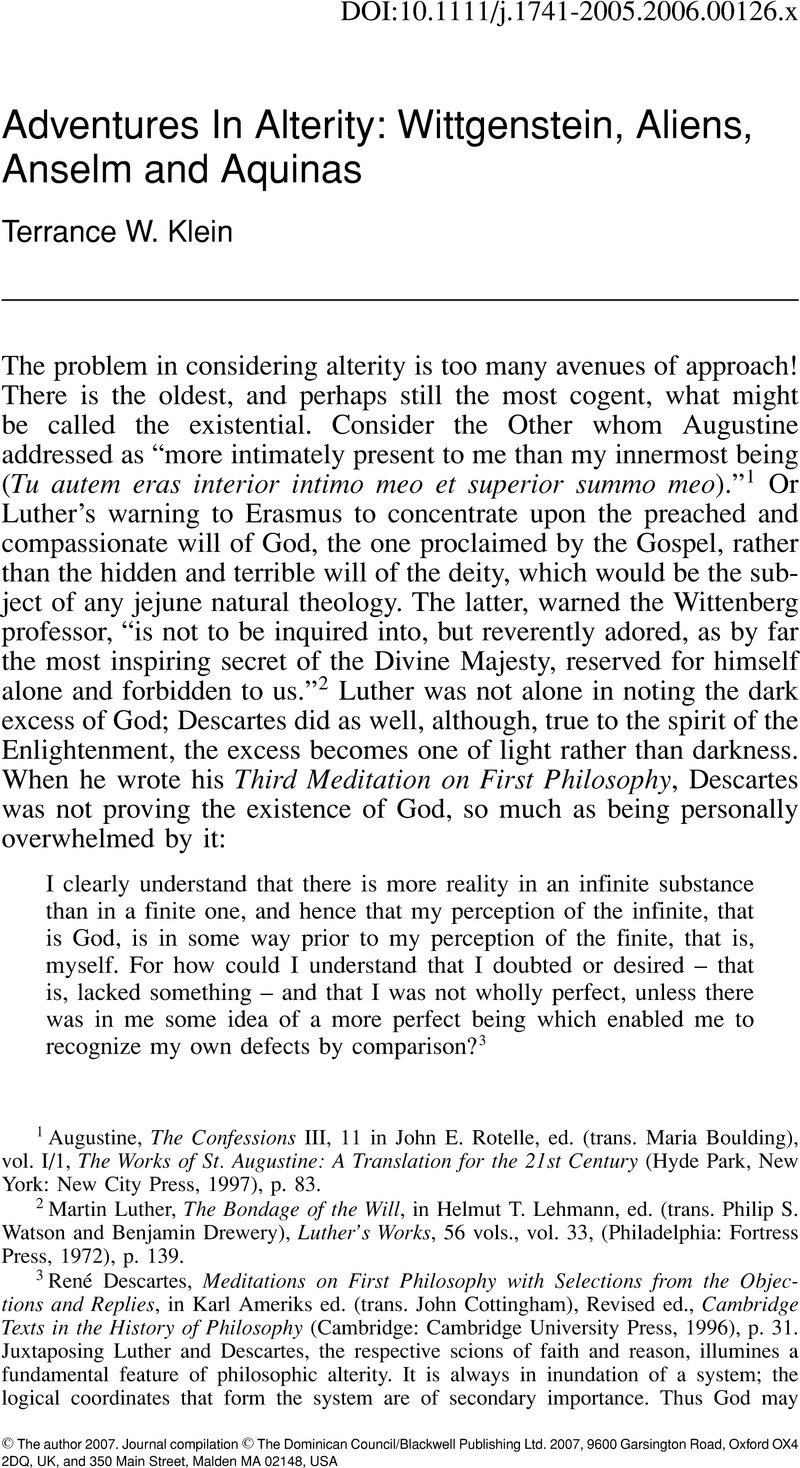Article contents
Adventures In Alterity: Wittgenstein, Aliens, Anselm and Aquinas
Published online by Cambridge University Press: 01 January 2024
Abstract

- Type
- Original Articles
- Information
- Copyright
- Copyright © The author 2007. Journal compilation © The Dominican Council/Blackwell Publishing Ltd. 2007
References
1 Augustine, The Confessions III, 11 in John E. Rotelle, ed. (trans. Maria Boulding), vol. I/1, The Works of St. Augustine: A Translation for the 21st Century (Hyde Park, New York: New City Press, 1997), p. 83Google Scholar.
2 Martin Luther, The Bondage of the Will, in Lehmann, Helmut T., ed. (trans. Watson, Philip S. and Drewery, Benjamin), Luther's Works, 56 vols., vol. 33, (Philadelphia: Fortress Press, 1972), p. 139Google Scholar.
3 René Descartes, Meditations on First Philosophy with Selections from the Objections and Replies, in Ameriks, Karl ed. (trans. Cottingham, John), Revised ed., Cambridge Texts in the History of Philosophy (Cambridge: Cambridge University Press, 1996), p. 31Google Scholar. Juxtaposing Luther and Descartes, the respective scions of faith and reason, illumines a fundamental feature of philosophic alterity. It is always in inundation of a system; the logical coordinates that form the system are of secondary importance. Thus God may coherently be considered as absolute darkness or light. What counts is the systemic-excess of the absolute.
4 Matthew Arnold “Dover Beach.”
5 Caputo, John D., “God Is Wholly Other – Almost: Différance and the Hyperbolic Alterity of God,” in Summerell, Orrin F., ed., The Otherness of God (Charlottesville: University Press of Virginia, 1998), p. 195Google Scholar.
6 Taylor, Mark, “Postmodern Times,” in Summerell, Orrin F., ed., The Otherness of God (Charlottesville: University Press of Virginia, 1998), p. 186Google Scholar.
7 See his essays “How to Avoid Speaking.” in Coward, Harold and Foshay, Toby, eds. (trans. Frieden, Ken), Derrida and Negative Theology. (Albany: SUNY Press, 1992), pp. 73–142Google Scholar; “Sauf le nom.” in Dutoit, Thomas, ed. (trans. Leavey, John P. Jr.), On the Name (Stanford: Stanford University Press, 1995), pp. 35–85Google Scholar; and “Faith and Knowledge” (trans. Weber, Samuel), in Religion (Stanford: Stanford University Press, 1996), pp. 1–78Google ScholarPubMed.
8 Levinas, Emmanuel, “The Old and the New,” in Time and the Other (Pittsburgh: Duquesne University Press, 1987), p. 121Google Scholar. Hereafter as Time and the Other.
9 Wittgenstein, Ludwig, (trans. Pears, D.F. and McGuinness, B.F.) Tractatus Logico-Philosohicus (London: Routledge, 1961)Google Scholar. Hereafter cited as Tractatus. Numbers following the paragraph signs in the text of this article refer to the proposition numbers that Wittgenstein assigned, which do not vary with the editions used.
10 Wittgenstein, Ludwig (trans. Anscombe, G.E.M.), Philosophical Investigations, 3 ed. (Oxford: Blackwell, 1967)Google Scholar. Hereafter cited as Investigations. Numbers appearing with the paragraph sign in this article refer to the section numbers assigned by Wittgenstein, which also do not vary with editions used.
11 Evelyn Toynton, “The Wittgenstein Controversy,”The Atlantic Monthly, June 1997, pp. 28–41, at p. 40.
12 Caputo, John D., “God Is Wholly Other – Almost: Différance and the Hyperbolic Alterity of God,” in Summerell, Orrin F., ed., The Otherness of God (Charlottesville: University Press of Virginia, 1998), 190–191Google Scholar.
13 Tractatus, 57.
14 Note the affinity between Wittgenstein and contemporary phenomenology on the self and its world. The one is the necessary construction of the other. Hence Levinas, “By encompassing everything within its universality, reason finds itself once again in solitude. Solipsism is neither an aberration nor a sophism; it is the very structure of reason. This is so not just because of the ‘subjective’ character of the sensations that it combines, but because of the universality of knowledge – that is, the unlimitedness of light and the impossibility of anything to be on the outside.” Emmanuel Levinas, Time and the Other, 65.
15 Kierkegaard, Soren, Philosophical Fragments/Johannes Climacus, trans. Hong, H.V. and Hong, E.H. (Princeton, 1985), 37Google Scholar. Hereafter Philosophical Fragments.
16 In treating Anselm, I am greatly indebted to the essay of Clayton, John, “The Otherness of Anselm,” in Summerell, Orrin F., ed., The Otherness of God (Charlottesville: University Press of Virginia, 1998)Google Scholar.
17 Anselm of Canterbury Proslogion in Hopkins, Jasper and Richardson, Herbert, trans., Complete Philosophical and Theological Treatises of Anselm of Canterbury (Minneapolis: The Arthur J. Banning Press, 2000), p. 93Google Scholar.
18 Ibid., 92.
19 Ibid., 103.
20 Ibid.
21 Ibid.
22 Tractatus, 57–58.
23 As Wittgenstein showed in the posthumous collection of his notes, Anscombe, G.E.M. and Wright, G.H. von, eds., On Certainty (trans. Denis Paul and G.E.M. Anscombe), (New York: Harper & Row, 1969)Google Scholar, all proof takes place within a system. Outside a given system, skepticism is literally meaningless. Trying to use language to prove the existence of God beyond language would do no more than to theologically assert that “a” implies “∼a,” but existence is not a predicate, as Kant showed.
24 Levinas, Time and the Other, 47–48.
25 Think: blue, green, blueish green, blueish blue green.
26 S.C.G. IV, 11.
27 S.C.G. III, 112 and frequently elsewhere.
28 Rahner, Karl, Spirit in the World, trans. Dych, William (London: Sheed and Ward, 1968)CrossRefGoogle Scholar.
29 Kierkegaard, Philosophical Fragments, 37. (My italics)
- 1
- Cited by




